初中英语常用句式(最全)讲课稿
初中英语常用句型总结课件

1.I think… 意为“我认为……”,是对某人或某事的看法 或态度的一种句型。其否定式常用 I don’t think… I don’t think+肯定句 我想...不 I don’t think I’ll take it. (我想我不买它了)
请注意:中文意思否定在从句中,但是英语的 表达否定在主句中。
(2) There be 结构中的be动词的单复数形式由后面挨近的一项的单 复数决定。
(3) There is a river near our school. 否:There is not a river near our school. 问:Is there a river near our school. 回答:Yes, there is. No, there isn’t. 划⑴How many rivers are there near our school? ⑵What’s near our school?
8.…think/find + it + adj. + to do sth. 此句型中的it是形式宾语,不可用其它代词替代,形容词作宾语的补
boy.
4. 征求意见的表达方式 (1) Would you like to do sth.? 你愿意做……吗? (2) Let sb. do sth. 意为“让某人做某事”,人后应用不带to的动词 不定式,其否定式为Don’t let sb,do sth.,或Let sb. not do sth. 另外,Let’s 与Let us的含义不完全相同,前者包括听者在内,后 者不包括听者在内。
进一步肯定对方的看法,表示“的确如此。”“是呀。”
---The book is a good book. ---So it is.=The book is really a
初中英语常见句型课件教学

初中英语常见句型课件教学初中英语常见句型课件教学初中英语常见句型课件句型1:There+be +主语+地点状语/ 时间状语There’s a boat in the river. 河里有条船。
There are seven days in a week. 一周有七天。
句型2:What’s wrong with+sb. / sth.What’s wrong with you你怎么啦What’s wrong with yo ur watch你的手表有什么毛病句型3:How do you like...How do you like China你觉得中国怎么样句型4:What do you like about...What do you like about China你喜欢中国的什么句型5:had better(not)+动词原形You’d better ask that policeman over there. 你最好去问问那边的那个警察。
句型6:How+adj. / adv. +主语+谓语!What a/ an+adj. +n. +主语+谓语!How cold it is today !今天多冷啊!What a fine picture it is!多美的一幅图画呀!句型7:Thank+sb. +for(doing)sth.Thank you for coming to see me. 感谢你来看我。
句型8:So+be/ 情态动词/ 助动词+主语He is a student. So am I. 他是一个学生,我也是。
句型9:... not ... until ...He didn’t have supper until his parents came back. 直到他的`父母回来他才吃饭。
句型10:比较级+and+比较级The baby cried harder and harder. 那孩子哭得越来越厉害。
初中英语说课稿常用语
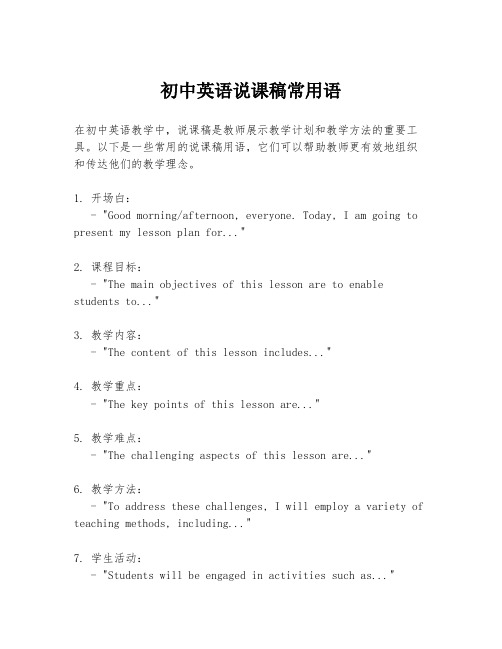
初中英语说课稿常用语在初中英语教学中,说课稿是教师展示教学计划和教学方法的重要工具。
以下是一些常用的说课稿用语,它们可以帮助教师更有效地组织和传达他们的教学理念。
1. 开场白:- "Good morning/afternoon, everyone. Today, I am going to present my lesson plan for..."2. 课程目标:- "The main objectives of this lesson are to enable students to..."3. 教学内容:- "The content of this lesson includes..."4. 教学重点:- "The key points of this lesson are..."5. 教学难点:- "The challenging aspects of this lesson are..."6. 教学方法:- "To address these challenges, I will employ a variety of teaching methods, including..."7. 学生活动:- "Students will be engaged in activities such as..."8. 教学媒体和教具:- "I will use various teaching aids and media, such as..."9. 课堂导入:- "To begin the lesson, I will start with a..."10. 课堂互动:- "Throughout the lesson, I will encourage student interaction through..."11. 课堂小结:- "Towards the end of the lesson, I will summarize the key points by..."12. 作业布置:- "As homework, students will be asked to..."13. 课后反思:- "After the lesson, I will reflect on the effectiveness of the teaching methods and..."14. 教学评价:- "The lesson will be evaluated based on students' performance in..."15. 结束语:- "I believe this lesson plan will be both engaging and informative for the students. Thank you for your attention."这些用语可以根据具体的教学内容和目标进行调整和补充,以确保说课稿的完整性和针对性。
初中六种基本句型教案英语
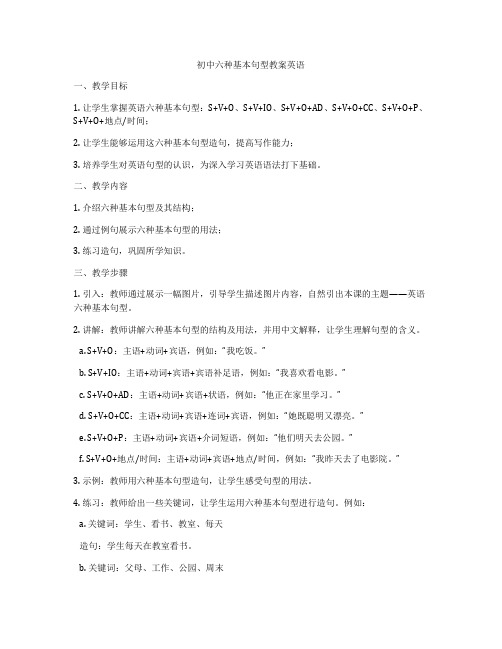
初中六种基本句型教案英语一、教学目标1. 让学生掌握英语六种基本句型:S+V+O、S+V+IO、S+V+O+AD、S+V+O+CC、S+V+O+P、S+V+O+地点/时间;2. 让学生能够运用这六种基本句型造句,提高写作能力;3. 培养学生对英语句型的认识,为深入学习英语语法打下基础。
二、教学内容1. 介绍六种基本句型及其结构;2. 通过例句展示六种基本句型的用法;3. 练习造句,巩固所学知识。
三、教学步骤1. 引入:教师通过展示一幅图片,引导学生描述图片内容,自然引出本课的主题——英语六种基本句型。
2. 讲解:教师讲解六种基本句型的结构及用法,并用中文解释,让学生理解句型的含义。
a. S+V+O:主语+动词+宾语,例如:“我吃饭。
”b. S+V+IO:主语+动词+宾语+宾语补足语,例如:“我喜欢看电影。
”c. S+V+O+AD:主语+动词+宾语+状语,例如:“他正在家里学习。
”d. S+V+O+CC:主语+动词+宾语+连词+宾语,例如:“她既聪明又漂亮。
”e. S+V+O+P:主语+动词+宾语+介词短语,例如:“他们明天去公园。
”f. S+V+O+地点/时间:主语+动词+宾语+地点/时间,例如:“我昨天去了电影院。
”3. 示例:教师用六种基本句型造句,让学生感受句型的用法。
4. 练习:教师给出一些关键词,让学生运用六种基本句型进行造句。
例如:a. 关键词:学生、看书、教室、每天造句:学生每天在教室看书。
b. 关键词:父母、工作、公园、周末造句:父母周末去公园工作。
c. 关键词:老师、教书、学校、高兴造句:老师在学校教书,很高兴。
5. 总结:教师引导学生总结本节课所学内容,加深对六种基本句型的认识。
四、课后作业1. 让学生运用六种基本句型写一篇小短文,描述自己的一天;2. 让学生找出身边的物品,用六种基本句型进行描述。
五、教学评价1. 课后收集学生的作业,检查对六种基本句型的掌握程度;2. 在下一节课开始时,让学生进行句型转换练习,检验所学知识是否牢固。
初中英语句型讲课稿范文
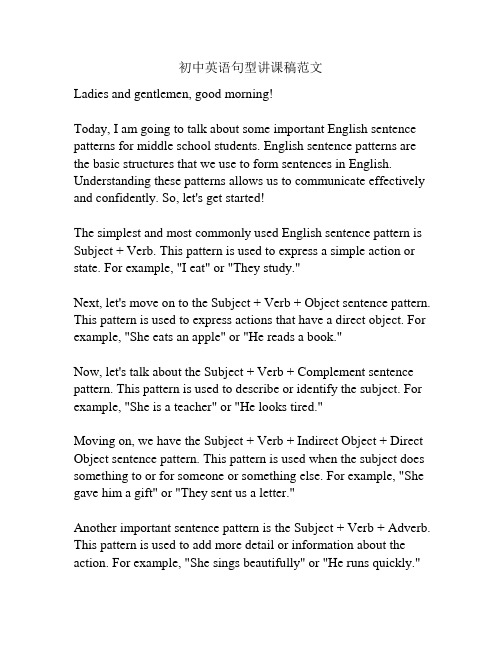
初中英语句型讲课稿范文Ladies and gentlemen, good morning!Today, I am going to talk about some important English sentence patterns for middle school students. English sentence patterns are the basic structures that we use to form sentences in English. Understanding these patterns allows us to communicate effectively and confidently. So, let's get started!The simplest and most commonly used English sentence pattern is Subject + Verb. This pattern is used to express a simple action or state. For example, "I eat" or "They study."Next, let's move on to the Subject + Verb + Object sentence pattern. This pattern is used to express actions that have a direct object. For example, "She eats an apple" or "He reads a book."Now, let's talk about the Subject + Verb + Complement sentence pattern. This pattern is used to describe or identify the subject. For example, "She is a teacher" or "He looks tired."Moving on, we have the Subject + Verb + Indirect Object + Direct Object sentence pattern. This pattern is used when the subject does something to or for someone or something else. For example, "She gave him a gift" or "They sent us a letter."Another important sentence pattern is the Subject + Verb + Adverb. This pattern is used to add more detail or information about the action. For example, "She sings beautifully" or "He runs quickly."Next, let's talk about the Subject + Verb + Adjective sentence pattern. This pattern is used to describe the subject. For example, "It is big" or "She is intelligent."Moving on, we have the Subject + Verb + Prepositional Phrase sentence pattern. This pattern is used to show the relationship between the subject and an object or location. For example, "He lives in a city" or "She plays on a team."Another important sentence pattern is the Subject + Linking Verb + Subject Complement. This pattern is used to describe or identify the subject. For example, "He is a doctor" or "She became a teacher."Let's now move on to the Subject + Verb + Object + Object Complement sentence pattern. This pattern is used when the object receives an action and is further described or modified. For example, "She painted the wall blue" or "They made him their leader."Next, we have the Subject + Verb + Noun Clause sentence pattern. This pattern is used when the subject completes an action on or towards a noun clause. For example, "She believes that he will come" or "He knows what to do."Lastly, let's talk about the Subject + Verb + Infinitive sentence pattern. This pattern is used when the verb is followed by the word "to" and a base form of the verb. For example, "She wants to dance" or "He needs to study."These are the basic English sentence patterns that middle school students should be familiar with. By understanding and practicing these patterns, students can improve their English communication skills and become more confident in speaking and writing.That's all for today's lesson. Thank you for your attention and participation. I hope you found this information helpful. Have a great day!。
初中英语句子结构及句型细致讲解 ppt课件

初中英语句子结构及句型细致讲解
❖ 1) The new term begins on the 1st of September.
❖ 2) His father is an engineer. ❖ 3) She seemed happy. ❖ 4) Li Hua showed me his album.
machines.
9
初中英语句子结构及句型细致讲解
❖ Tom is a handsome boy. ❖ The two boys are students. ❖ His boy needs Tom's pen. ❖ The boy in the classroom needs a pen of yours. ❖ The boy needs a ball pen. ❖ The best boy here is Tom. ❖ There is nothing to do today. ❖ The smiling boy needs a pen bought by his mother. ❖ This is the new dictionary which I bought yesterday.
原因状语
18
英语句子有长在短,有简有繁,从现象看,似乎千
变万化,难以捉摸,但从实质看,可以发现其内在联系, 找出其共同规律。英语句子的基本结构可以归纳成五种 基本句型及其扩大、组合、省略或倒装。掌握这五种基 本句型,是掌握各种英语句子结构的基础。
英语五种基本句型列式如下:
基本句型一: S +V
(主+谓)
❖ 4) All the pupils are on the playground now.
❖ 5) Our aim is to win more medals.
初中英语口语句型总结教案
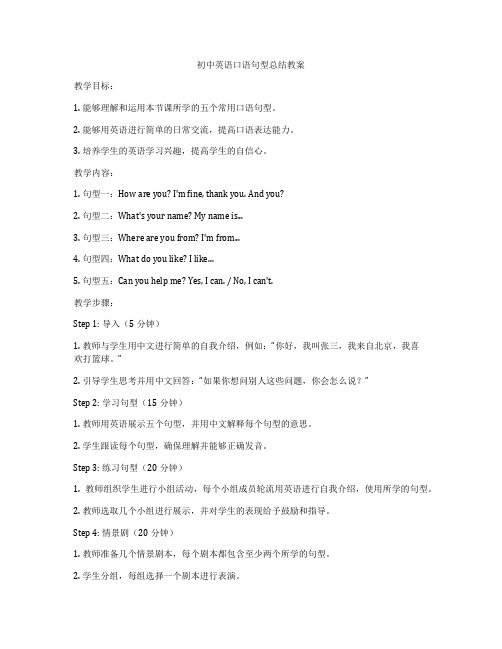
初中英语口语句型总结教案教学目标:1. 能够理解和运用本节课所学的五个常用口语句型。
2. 能够用英语进行简单的日常交流,提高口语表达能力。
3. 培养学生的英语学习兴趣,提高学生的自信心。
教学内容:1. 句型一:How are you? I'm fine, thank you. And you?2. 句型二:What's your name? My name is...3. 句型三:Where are you from? I'm from...4. 句型四:What do you like? I like...5. 句型五:Can you help me? Yes, I can. / No, I can't.教学步骤:Step 1: 导入(5分钟)1. 教师与学生用中文进行简单的自我介绍,例如:“你好,我叫张三,我来自北京,我喜欢打篮球。
”2. 引导学生思考并用中文回答:“如果你想问别人这些问题,你会怎么说?”Step 2: 学习句型(15分钟)1. 教师用英语展示五个句型,并用中文解释每个句型的意思。
2. 学生跟读每个句型,确保理解并能够正确发音。
Step 3: 练习句型(20分钟)1. 教师组织学生进行小组活动,每个小组成员轮流用英语进行自我介绍,使用所学的句型。
2. 教师选取几个小组进行展示,并对学生的表现给予鼓励和指导。
Step 4: 情景剧(20分钟)1. 教师准备几个情景剧本,每个剧本都包含至少两个所学的句型。
2. 学生分组,每组选择一个剧本进行表演。
3. 教师在表演过程中给予指导,并在表演结束后进行点评。
Step 5: 总结与作业(5分钟)1. 教师引导学生用中文总结本节课所学的五个句型。
2. 教师布置作业:用英语写一篇关于自己的小短文,尽量使用所学的句型。
教学评价:1. 观察学生在课堂上的参与度和积极性,以及他们的发音准确性。
2. 评估学生在小组活动和情景剧表演中的表现,以及他们的口语表达能力。
初中英语作文万能句型总结讲课讲稿
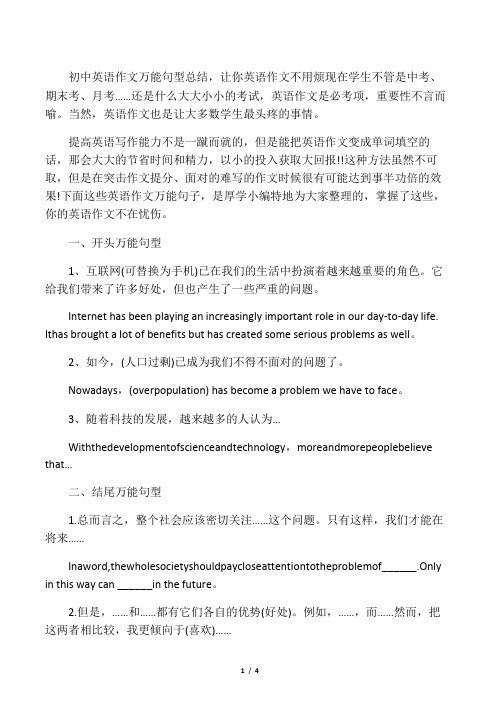
初中英语作文万能句型总结,让你英语作文不用烦现在学生不管是中考、期末考、月考……还是什么大大小小的考试,英语作文是必考项,重要性不言而喻。
当然,英语作文也是让大多数学生最头疼的事情。
提高英语写作能力不是一蹴而就的,但是能把英语作文变成单词填空的话,那会大大的节省时间和精力,以小的投入获取大回报!!这种方法虽然不可取,但是在突击作文提分、面对的难写的作文时候很有可能达到事半功倍的效果!下面这些英语作文万能句子,是厚学小编特地为大家整理的,掌握了这些,你的英语作文不在忧伤。
一、开头万能句型1、互联网(可替换为手机)已在我们的生活中扮演着越来越重要的角色。
它给我们带来了许多好处,但也产生了一些严重的问题。
Internet has been playing an increasingly important role in our day-to-day life. Ithas brought a lot of benefits but has created some serious problems as well。
2、如今,(人口过剩)已成为我们不得不面对的问题了。
Nowadays,(overpopulation) has become a problem we have to face。
3、随着科技的发展,越来越多的人认为…Withthedevelopmentofscienceandtechnology,moreandmorepeoplebelieve that…二、结尾万能句型1.总而言之,整个社会应该密切关注……这个问题。
只有这样,我们才能在将来……Inaword,thewholesocietyshouldpaycloseattentiontotheproblemof______.Only in this way can ______in the future。
2.但是,……和……都有它们各自的优势(好处)。
七年级英语讲义
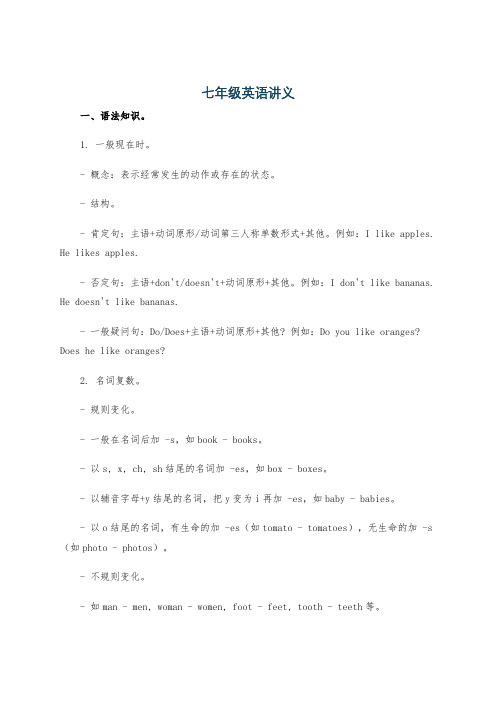
七年级英语讲义一、语法知识。
1. 一般现在时。
- 概念:表示经常发生的动作或存在的状态。
- 结构。
- 肯定句:主语+动词原形/动词第三人称单数形式+其他。
例如:I like apples. He likes apples.- 否定句:主语+don't/doesn't+动词原形+其他。
例如:I don't like bananas. He doesn't like bananas.- 一般疑问句:Do/Does+主语+动词原形+其他? 例如:Do you like oranges? Does he like oranges?2. 名词复数。
- 规则变化。
- 一般在名词后加 -s,如book - books。
- 以s, x, ch, sh结尾的名词加 -es,如box - boxes。
- 以辅音字母+y结尾的名词,把y变为i再加 -es,如baby - babies。
- 以o结尾的名词,有生命的加 -es(如tomato - tomatoes),无生命的加 -s (如photo - photos)。
- 不规则变化。
- 如man - men, woman - women, foot - feet, tooth - teeth等。
3. 形容词性物主代词。
- 包括my(我的)、your(你的/你们的)、his(他的)、her(她的)、its (它的)、our(我们的)、their(他们的)。
- 用法:形容词性物主代词后面必须接名词,用来表示所属关系。
例如:This is my book.二、词汇积累。
1. 家庭成员类。
- father(父亲)、mother(母亲)、parent(父母)、grandfather(祖父/外祖父)、grandmother(祖母/外祖母)、grandparent(祖父母/外祖父母)、brother (兄弟)、sister(姐妹)、son(儿子)、daughter(女儿)等。
人教版初中英语语法总结讲课稿
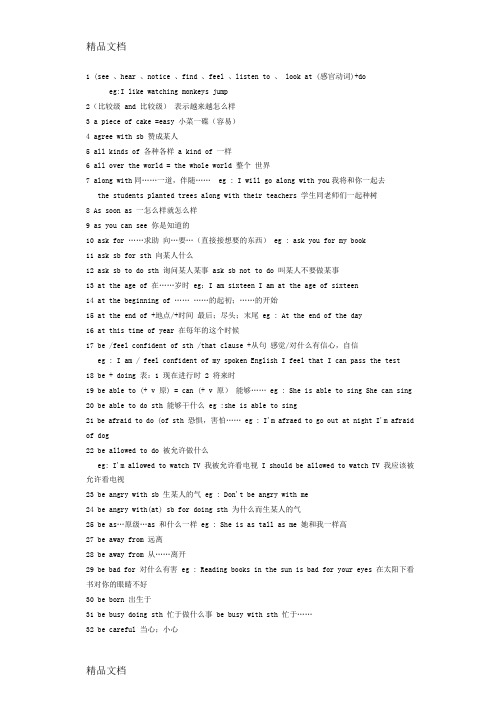
1 (see 、hear 、notice 、find 、feel 、listen to 、 look at (感官动词)+doeg:I like watching monkeys jump2(比较级 and 比较级)表示越来越怎么样3 a piece of cake =easy 小菜一碟(容易)4 agree with sb 赞成某人5 all kinds of 各种各样 a kind of 一样6 all over the world = the whole world 整个世界7 along with同……一道,伴随…… eg : I will go along with you我将和你一起去the students planted trees along with their teachers 学生同老师们一起种树8 As soon as 一怎么样就怎么样9 as you can see 你是知道的10 ask for ……求助向…要…(直接接想要的东西) eg : ask you for my book11 ask sb for sth 向某人什么12 ask sb to do sth 询问某人某事 ask sb not to do 叫某人不要做某事13 at the age of 在……岁时 eg:I am sixteen I am at the age of sixteen14 at the beginning of …… ……的起初;……的开始15 at the end of +地点/+时间最后;尽头;末尾 eg : At the end of the day16 at this time of year 在每年的这个时候17 be /feel confident of sth /that clause +从句感觉/对什么有信心,自信eg : I am / feel confident of my spoken English I feel that I can pass the test18 be + doing 表:1 现在进行时 2 将来时19 be able to (+ v 原) = can (+ v 原)能够…… eg : She is able to sing She can s ing20 be able to do sth 能够干什么 eg :she is able to sing21 be afraid to do (of sth 恐惧,害怕…… eg : I'm afraed to go out at night I'm afraid of dog22 be allowed to do 被允许做什么eg: I'm allowed to watch TV 我被允许看电视 I should be allowed to watch TV 我应该被允许看电视23 be angry with sb 生某人的气 eg : Don't be angry with me24 be angry with(at) sb for doing sth 为什么而生某人的气25 be as…原级…as 和什么一样 eg : She is as tall as me 她和我一样高27 be away from 远离28 be away from 从……离开29 be bad for 对什么有害 eg : Reading books in the sun is bad for your eyes 在太阳下看书对你的眼睛不好30 be born 出生于31 be busy doing sth 忙于做什么事 be busy with sth 忙于……32 be careful 当心;小心33 be different from…… 和什么不一样34 be famous for 以……著名35 be friendly to sb 对某人友好36 be from = come from 来自 eg :He is from Bejing He comes from Bejing Is he from Bejing ? Does he come from Bejing ?37 be full of 装满……的 be filled with 充满 eg: the glass is full of water the glass is filled with water38 be glad+to+do/从句39 be going to + v(原)将来时40 be good at(+doing) = do well in 在某方面善长, 善于……41 be good for 对什么有好处 eg : Reading aloud is good for your English42 be happy to do 很高兴做某事43 be helpful to sb 对某人有好处eg : Reading aloud is helpful to you 大声朗读对你有好处Exercising is helpful to your bady 锻炼对你的身体有好处44 be in good health 身体健康45 be in trouble 处于困难中 eg : She is in trouble They are in tronble46 be interested in 对某方面感兴趣47 be late for = come late to 迟到 eg: Be late for class 上课迟到48 be like 像…… eg : I'm like my mother49 be mad at 生某人的气50 be made from 由……制成(制成以后看不见原材料)51 be made of 由……制成(制成以后还看得见原材料)52 be not sure 表不确定53 be on a visit to 参观54 be popular with sb 受某人欢迎55 be quiet 安静56 be short for 表**的缩写 eg: 陶 is short for 陶俊杰57 be sick in bed 生病在床58 be sorry to do sth be sorry for sb eg : I am sorry for you59 be sorry to hear that60 be sorry to trouble sb eg : I am sorry to trouble you61 be strict in doing sth 严于做某事 eg : He's strict in obeying noles62 be strict with sb 对某人要求严格 eg: Some students are not strict with them selves 这些学生对自己不严格63 be strict with sb in sth 某方面对某人严格64 be supposed to do 被要求干什么65 be sure 表确定66 be sure of doing sth 对做某事有信心 eg: He is sure of winning I am sure of learning English well67 be sure of sth 对做某事有信心 eg: I'm sure of my head (my teacher 我相信我的大脑(老师)68 be sure that sth 对做某事有信心 eg: I'm suer that he can pass the test 我相信他能通过考试69 be sure to do sth一定会做某事eg: We are sure to pass the test 我们一定会通过这次考试We are sure to learn English well 我们一定能学好英语70 be terrified of + 名/动doing 害怕……71 be terrified to do sth 害怕做某事72 be t he same as … 和什么一样73 be used to doing sth 习惯做某事eg: My father is used to getting up early 我爸爸习惯早He is used to sleeping in class 他习惯上课睡觉74 be worth doing 值得做什么75 be(feel) afraid to do sth 害怕做某事be afraid of sth 害怕某物 be afraid that 丛句76 because+句子 because of +短语eg : He was late because he had a headache He was late because of his headache77 begin to do = start to do 开始做某事start…with…=begin…with… 以什么开始什么eg : Let's begin the game with the song I begin to go home78 between…and… 两者之间79 borrow sth from sb 向……借…… lend sth to sb ( lend sb sth 借给……什么东西eg : I borrowed a pen from him he lent a pen to me ( he lent me a pen80 both = the same(as) = not different(from) 表相同81 bother 打扰 bother sb to do stheg : I'm sorry to bother you ,but can you tell me to way to the station我十分道歉打扰你,但是你能告诉我怎么去车站the problem has been bothering me for weeks 这个问题困扰了我几个周了He's bothering me to lend him money82 by the end of 到……为止83 call sb sth eg : We call him old wang84 care 关心 eg : Don't you care about this country's future ?你为什么不关心国家的未来85 catch up with sb 赶上某人86 chat with sb 和某人闲谈 take sb to + 地点带某人去某地87 come in 进88 come over to 过来89 come up with 提出 eg: Can you come up with a good idea 你能想出一个好办法吗?90 communicate with sb 和某人交流91 consider + doing 考虑做什么 eg : Why not consider going to lu zhou 为什么不考虑去泸州?92 dance to 随着……跳舞 eg : She likes dancing to the music 她喜欢随着音乐跳舞93 decide to do sth 决定做某事94 do a survey of 做某方面的调查95 do better in 在……方面做得更好96 do wrong 做错97 Don't forget to do sth 不要忘了做某事98 Don't mind +doing /从句 /名词不要介意……99 each +名(单)每一个…eg : Each student has many books 每一个学生都有一些书101 enjoy +doing喜欢102 escape from 从……逃跑eg: The prisoners have escaped from the prison犯人从监狱里逃跑出来103 expect to do sth 期待做某事104 fall down 摔下来 fall off 从哪摔下来105 fall in love with sb /sth 爱上什么106 far from 离某地远 eg : The school is far from my home 107 find +it +adj +to do 发现做某事怎么样108 find sb/sth +adj 发现什么怎么样 eg : I find the book interesting109 finish 完成+doing(名词)110 fit to sb = be fit for sb 适合某人111 forget to do 没有做而忘了 forget doing 做了而又忘了 eg: Don't forget to go home I forget closing door 112 from…to… 从某某到某某 eg: From me for her113 get /have sth down 做完,被(别人)做…eg: I have my hair cut 我理了发(头发被剪了)Tom got his bad tooth pulled out 汤母把他的坏牙拔掉了(被牙医拔掉了)114 get a part-time job= find a part-time job115 get along well with sb = get on well with sb 与某人相处得好116 get along with sb = get on with sb 与某人相处117 get ready for = be ready for为什么而准备eg : I get ready for math I am ready for math 118 get sb in to trouble 给某人麻119 get sb to do sth120 get…from… 从某处得到某物121 give a talk 做报告 eg: He is give a tall122 give sth to sb give sb sth 给某人某物123 go fish 钓鱼 go swimming 游泳124 go on to do 去做下一件事 go on doing 继续做这件事125 go out away from go out of126 go to school 上学(用于专业的)go to the school 去学校(不一定是上学)127 good way to 好方法128 hate to do 讨厌没做过的事 hate doing 讨厌做过的事129 have a party for sb 举办谁的晚会130 have a talk 听报告谈一谈131 have been doing 现在完成进行时 eg : You have been talking You have been sleeping since 132 have been to …( 地方)……去过某过地方have gone to …(地方)去了某地还没回来133 have fun +doing 玩得高兴134 have sth to do 有什么事要做eg: I have a lot of homework to do 我有很多家庭作业要做 I have nothing to do 我没什么事情做135 have to do sth 必须做某事136 have trouble (problem) (in) doing sth 做什么事情有麻烦137 have…time +doing138 have…(时间)…off 放……假 eg: I have month off 我请一个月得假139 hear sb +do/doing 听见某人做某事/正在做某事140 help a lot 很大用处141 help sb with sth \one's sth 帮助某人某事(某方面) help sb (to) do sth 帮助某人做某事142 hope to do sth 希望做某事143 How about(+doing) = What about(+doing)144 how do you like = what do you think of 你对什么的看法145 if : 是否=wethereg: I don't know if (wether) I should go to the party 我不知道我是否应该去参加晚会He don't know if (wether) we will arrive on time tomorrow morning 他不知道我们明天早上是否能准时到达146 if :如果,假如(全部接一般时态)+条件语态从句eg: I'll go to LuZhou if it does't rain 假如明天不下雨,我就去泸州If they change the plan they will let me know 假如他们要改变计划,他们会让我知道的I'll go to England ,if I have enough money next year 如果我明年由足够的钱,我就要去英国147 in one's opinion = sb think 某人认为148 in some ways 在某些方面149 in the end = finally(adv) 最后150 in the north of… 什么在什么的北方(north 北 sowth 南 west 西 east 东)151 in the sun 在太阳下152 increase 增加eg : They've increased the prece of petrol by 3% 他们把石油价增加了3%the population has increased from 12 million ten years ago to 18 million now153 instead of +(名)代替eg: I'd like an apple instead of a pear 我想要苹果,而不要梨子I like English instead of math 我喜欢英语而不喜欢数学154 introduce sb to sb 介绍某人给某人 introduce oneself 自我介绍155 invite sb to do sth 邀请某人做某事156 It takes sb sometime to do sth 做某人花掉某人多少时间eg : It took me 5 minutes to do my homework It takes me half an hour to cook157 It's +adj +for sb to do sth 对某人来说做某事怎么样158 It's +adj +to do 做某事怎么样159 It's +adj for sb 对于某人来说怎么样 It's +adj of sb 对某人来说太怎么样160 It's +adj(for sb) to do(对某人来说)做某事怎么样 It's +adj of sb to do sth 对某人来说做某事太怎么样eg : It's nice of you to help me with my English161 It's a good idea for sb to do sth 对…… 来说是个好主意162 It's important to sb 对某人来说很重要 eg: It's important to me163 It's time to do sth It's time for sth 到了该去做某事的时间eg : It's time to have class It's time for class 该去上课了164 join = take part in 参加165 just now 刚才166 keep +sb /sth +adj /介词短语让什么保持什么样?167 keep out 不让…… 进入168 keep sb adj 让……保持…… eg: I want to keep my mother hap py keep healthy 保持健康169 key to +名词表示:某物的钥匙或某题的答案170 key to… anser to … key 可以是答题或钥匙171 laugh at… 取笑…… eg : Don't langh at others We langhed at the joke172 learn by oneslfe 自学173 learn from sb 向某人学习 eg: We should learn from Lei Feng174 learn to do sth 学做某事175 let sb do sth 让某人做某事176 Let sb down 让某人失望 eg : We shouldn't let our farents down 我们不应该让我们的父母失望177 live from :离某地远178 live in +大地方 /at +小地方居住在某地 eg: I live in LuZhou She lives at XuanTan 179 look after = take care of 照顾照看180 lose one's way 谁迷路 eg : Lose your way 你迷路181 make a decision to do sth 决定做某事182 make friends with sb 和谁成为朋友 eg : I want to make friends with you183 make it early 把时间定的早一点184 make on exhibition of oneself 让某人出洋相185 make sb /n +n 使什么成为什么 eg : I made her my step moller I made you my wife 186 make sb /sth +adj 使某人(某物)怎么样 eg : You must made your bed clean187 make sb /sth adj 使某人/某物怎么样188 make sb do sth 让某人做某事 eg : I made him write 我以前让他写189 make up be made up of (被动语态)由……组成190 make…difference to…191 mind sb to do mind one's doing 介意……做什么192 most +名 most of +代193 much too +形容词194 must be 一定195 need +名词196 need sb do sth 需要某人做某事197 need to do (实义动词) need do (情态动词)198 no /neithr of hate to do no /neithr of hate doing199 no +名词200 not anymore = no more 再也不…… eg: He didn't cry any more He cried no more 他再也不哭201 not… (形、副)at all eg: He's not tall at all she doesn't junp far at all202 not…at all 一点都不203 not…either 表否定,也不 eg : I don't japanse either I don't have sister, either 我也没有姐姐204 not…until 直到……才……eg: I didn't sleep until my mother came back The child didn't stop crying until I give her sugar205 offer / provide sb with sth 给某人提供206 offer sb sth ( offer sth to sb 提供什么东西给某人 eg : I offer you water (I offer water to you 我给你提供水207 on one's way to… 在谁去那的路上208 on the one hand 一方面 on the other hand 另一方面209 on the phone = over the phone 用电话交谈210 on time 准时 in time 及时211 one day =some day =someday 一天,有一天212 one of +可数名词的复数形式213 one to another 一个到另一个214 over and over agin 一遍又一遍的 eg : He cleaned the floor over and over agin215 part-time job 兼职工作 fall-time job 全职工作216 pay for… 付……钱 pay the bill 开钱,付钱217 please +do218 please help yourself219 pleased with sb220 pool into = pore into221 practice +doing 练习做某事222 prefer sth to sth 相对……更喜欢…… eg : I prefer physics to chemisty 在物理和化学中,我更喜欢物理prefer doing to sth 更喜欢去做…不愿意去做… eg: He prefers riding a bike to diving 他更喜欢骑自行车,不开小车prefer to do sth rather than do sth 宁愿做…也不愿 eg: My unde prefers to buy a now car rather than repaiv the used one 我叔叔更喜欢买新的车,也不去修旧车prefer sb not to do sth 更愿意… eg: I prefer her not to come 我不喜欢她不来223 pretend to do sth 装着去做什么 pretend that 从句eg : The two cheats pretended to be working very hard 这两个骗子装着努力工作He pretended that he did not know the answer 他装着不知道答案224 rather…than 宁可……也不……eg : I would rather be a doctor than a teacher 我愿肯当医生,也不当老师He likes dogs rather than cats 他喜欢狗,不喜欢猫225 regard…as 把……当作……eg: Please give my best regards to your family 请带我向你的家人我最好的问候I regard you as my friend 我把你当作我的朋友He shows little regard for others 他不爱关心别人226 remid sb about sth 提醒某人什么事 remid sb to do sth 提醒某人做某事eg : he remids me about cooking (he remids me to cook 他提醒我做饭227 remid sb of sth 使某人想起什么eg : the pictures remind me of my school days 这照片使我想起了我的学校the words that (which) the teacher talke to remind me of my mother228 return sth to sb 还什么东西给某人229 say to oneself 对自己说230 say to sb 对某人说231 sb spend somemoney on sth 花了多少钱在某事上232 sb spend sometime with sb 花了多少时间陪谁233 sb spend sometime(in) doing sth 花了多少时间做某事234 sb with sb +is sb and sb +are235 see sb do 看见某人做过某事 see sb doing 看见某人正在做某事236 seem to do/be +adj 显得怎么样 eg : You seem to be tired You seem to be happy237 send +sb sth 送给某人某物238 send…to…把什么寄到哪里去?239 shock 使……震惊 eg : Oh , It's only you ! You give me a shock 啊,是你呀!吓我一跳240 show sb sth 向某人展示某物 eg : I show her the book.241 show sb sth = show sth to sb 拿什么东西给某人看 eg: Show me your pen Show your pen to me242 show sth to sb 向某人展示某物 eg : I show the book to her.243 some…others… 一些……另一些……244 start…with… 从……开始begin…with… 从……开始245 stay away from 远离……eg : We're told to stay away from the animals whe visiting the zoo 当我们参观zoo 时,我们要远离动物If you want to lose weight you'd better stay auay from the sweet food 徒工你想减肥,你最好远离甜食246 stop doing 停下正在做的事247 stop sb from doing sth 阻止某人做某事248 stop sb(from) doing 阻止某人做某事249 stop to do 停下正在做的事去做下一件事250 such +名这样,这种251 suit sb 适合某人252 surprise sb 使某人惊奇 to one's surprise 令某人惊奇253 take classes 上课254 take sb to 把某人带去 eg : I take you to the hospital255 take walks = take a walk = go for a walk 散步256 ①talk to 对谁说eg : I talk to you ② talk with 和谁说 eg : I talk with him③ talk of 谈到eg : we talked of you ④ talk about 谈论关于……257 talk with sb 和某人说话258 teach sb sth 教某人做某事259 tell sb do sth 告诉某人做某事260 tell sb sth tell sb that 丛句 tell sb not to do sth tell a story261 tell sb sth 告诉某人某事262 tell sb to do sth 告诉某人做什么 tell sb not to do sth 告诉某人不要做什么263 tell…from…264 thank you for +doing265 the same +名词(doing)+as……266 the same…(名)…as as…(adj adv)…as 相同267 the way to do sth = the way of doing st做某方面的方法the way to +地方去哪的路 eg:Do you know the way to learn English Do you know the way of learning English268 the way to…(地点)到哪的269 too…to… 太怎样而不能……adj +enough to 足够…能… so…that +丛句eg: He is too young to go to school = He is so young that he can't go to schoolHe is old enough to go to school = He is so old that he can go to school270 transalte ……into…… 把什么翻译成什么 eg : Trasalte English into chinese271 travel with sb和某人去旅游272 try one's best to do sth尽某人最大的努力去做某事eg: I will try my best to learn English well273 try to do sth 想干什么,但没成功 try doing sth 想干什么,已经做过了eg :He tried to climb 他想爬上去,但没成功 He tried climbing 他想爬上去,已经做过了274 try…试衣服 have a try 试一下275 turn down 开小←→ turn up 开大276 turn off 关上←→ turn on 打开 open 拆开277 upside down 倒着278 visit to… 参观某个地方279 wait for sb 等某人。
初中英语基本句型说课稿
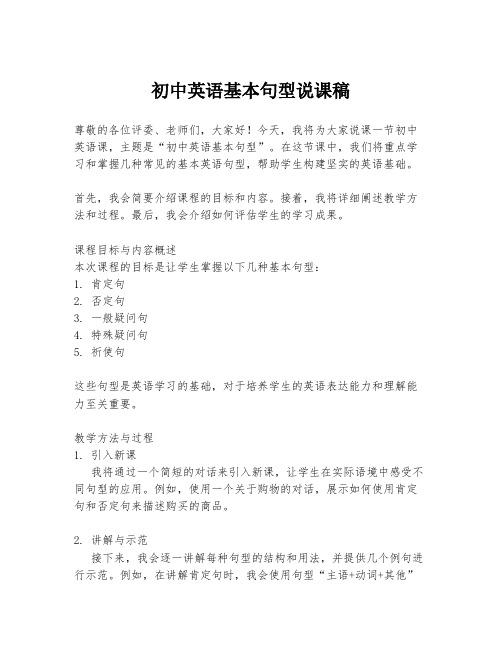
初中英语基本句型说课稿尊敬的各位评委、老师们,大家好!今天,我将为大家说课一节初中英语课,主题是“初中英语基本句型”。
在这节课中,我们将重点学习和掌握几种常见的基本英语句型,帮助学生构建坚实的英语基础。
首先,我会简要介绍课程的目标和内容。
接着,我将详细阐述教学方法和过程。
最后,我会介绍如何评估学生的学习成果。
课程目标与内容概述本次课程的目标是让学生掌握以下几种基本句型:1. 肯定句2. 否定句3. 一般疑问句4. 特殊疑问句5. 祈使句这些句型是英语学习的基础,对于培养学生的英语表达能力和理解能力至关重要。
教学方法与过程1. 引入新课我将通过一个简短的对话来引入新课,让学生在实际语境中感受不同句型的应用。
例如,使用一个关于购物的对话,展示如何使用肯定句和否定句来描述购买的商品。
2. 讲解与示范接下来,我会逐一讲解每种句型的结构和用法,并提供几个例句进行示范。
例如,在讲解肯定句时,我会使用句型“主语+动词+其他”来构建句子,并给出例句“Tom plays football every weekend.”3. 互动练习为了让学生更好地理解和掌握这些句型,我将设计一系列的互动练习。
学生将分组进行练习,每组需要用不同的句型来描述图片中的场景。
这样的活动可以增强学生的口语表达能力和团队合作能力。
4. 巩固提高在互动练习后,我会通过一些小测试来巩固学生所学的知识。
这些测试将包括填空题、选择题和改错题,旨在检验学生对基本句型的理解和应用能力。
5. 总结反馈课程的最后,我会对学生的学习情况进行总结,并给予反馈。
我会强调基本句型在英语学习中的重要性,并鼓励学生在日常生活中多加练习和应用。
评估学生学习成果为了评估学生的学习成果,我将采用以下几种方法:1. 课堂观察:观察学生在课堂上的参与度和反应,了解他们对句型的理解和应用情况。
2. 互动练习:通过学生在小组练习中的表现来评估他们的口语能力和团队合作能力。
3. 小测试:通过填空题、选择题和改错题来评估学生对基本句型的掌握程度。
初中英语常用句式模板教案
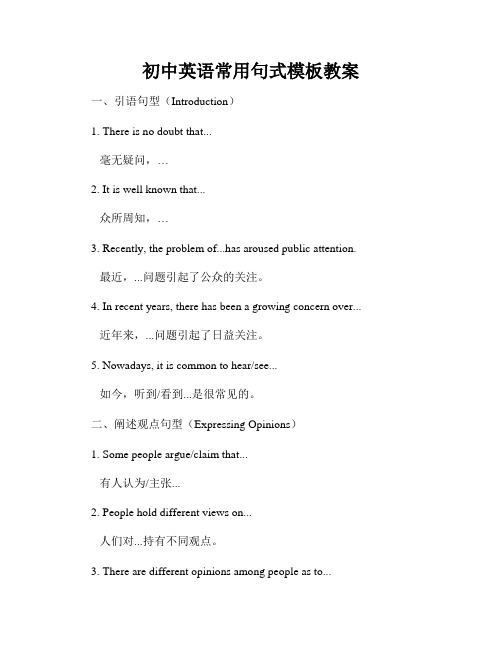
初中英语常用句式模板教案一、引语句型(Introduction)1. There is no doubt that...毫无疑问,…2. It is well known that...众所周知,…3. Recently, the problem of...has aroused public attention.最近,...问题引起了公众的关注。
4. In recent years, there has been a growing concern over...近年来,...问题引起了日益关注。
5. Nowadays, it is common to hear/see...如今,听到/看到...是很常见的。
二、阐述观点句型(Expressing Opinions)1. Some people argue/claim that...有人认为/主张...2. People hold different views on...人们对...持有不同观点。
3. There are different opinions among people as to...关于...,人们持有不同的观点。
4. As far as I am concerned, I believe that...就我个人而言,我认为...5. Personally, I think/believe that...就我个人来说,我认为...三、原因解释句型(Explaining Reasons)1. The reason why...is that......的原因是...2. One of the reasons for...is that......的原因之一是...3. A further/second reason for...is that......的进一步原因是...4. I must emphasize that...我必须强调...5. The first reason is that...第一个原因是...四、列举观点句型(Listing Points)1. Firstly/First and foremost,...首先/首要的是...2. Secondly,...其次,...3. What's more,...而且/更重要的是...4. In addition,...此外/另外...5. Finally,...最后/最后一点是...五、对比观点句型(Contrasting Opinions)1. However, some people think/believe that...然而,有人认为/相信...2. Others may argue that...其他人可能会争辩说...3. On the one hand,...on the other hand,...一方面,...另一方面,...4. While it is true that..., I believe that...尽管...是对的,我相信...5. Despite the fact that..., I still believe that...尽管事实上...,我仍然相信...六、结尾句型(Concluding)1. In conclusion,...总之/总结起来/最后一句是...2. From what has been discussed above,...综上所述/根据以上讨论...3. Taking all these factors into consideration,...考虑到所有这些因素...4. All in all,...总的来说/总而言之...5. Therefore, it is clear that...因此,很明显/显然...七、举例句型(Giving Examples)1. For example,...例如/比如/举个例子...2. Take...as an example.以...为例。
- 1、下载文档前请自行甄别文档内容的完整性,平台不提供额外的编辑、内容补充、找答案等附加服务。
- 2、"仅部分预览"的文档,不可在线预览部分如存在完整性等问题,可反馈申请退款(可完整预览的文档不适用该条件!)。
- 3、如文档侵犯您的权益,请联系客服反馈,我们会尽快为您处理(人工客服工作时间:9:00-18:30)。
讲义二:初中英语常用句式回信类作文句型汇总:1. It is my great pleasure to hear from you (万能回信开头句)2. 表建议句型It is highly suggested that you should(not)…In addition, you are supposed to do sthMeanwhile,…is also a good way for you.3.高级词汇的顺序词to begin with,可替换at first,then\next, 可替换second,finally, 可替换third,4. 可被替换的连词however, 可替换buttherefore 可替换sootherwise 可替换or中考作文常用句型:1. 不用说……It goes without saying that …= (It is) needless to say (that) ….= It is obvious that ….例:不用说早睡早起是值得的。
It goes without saying that it pays to keep early hours.2. 在各种……之中,……Among various kinds of …, …/= Of all the …, …例︰在各种运动中我尤其喜欢慢跑。
Among various kinds of sports, I like jogging in particular.3. 就我的看法……;我认为……In my opinion, …= To my mind, …= As far as I am concerned, …= I am of the opinion that ….例:In my opinion, playing video games not only takes much time but is also harmful to health.就我的看法打电动玩具既花费时间也有害健康。
4. 随着人口的增加……With the increase/growth of the population, …随着科技的进步……With the advance of science and technology, …例:With the rapid development of Taiwan's economy, a lot of social problems have come to pass.随着台湾经济的快速发展许多社会问题产生了。
5. ……是必要的It is necessary (for sb.) to do / that ………是重要的It is important/essential (for sb.) to do / that ………是适当的It is proper (for sb.) to do / that ………是紧急的It is urgent (for sb.) to do / that …例:It is proper for us to keep the public places clean.It is proper that we (should) keep the public places clean. 我们应当保持公共场所清洁。
6. 花费spend …on sth. / doing sth. …例:我们不应该在我们不感兴趣的事情上花太多的时间。
We shouldn't spend too much time on something we aren't interested in.7. how 引导的感叹句例:那至少可以证明你很诚实。
At least it will prove how honest you are.8. 状语从句:A) 如果你不……,你就会……If you don't ..., you'll ...例︰If you don't keep working hard, you'll lose the chance.如果你不坚持努力工作,你就会失去这次机会。
B) 如此……,以至于……so …that …例:At that moment, I was so upset that I wanted to give up. 当时,我非常伤心,最后都想放弃了。
C) 每当我听到……我就忍不住感到兴奋。
Whenever I hear …, I cannot but feel excited.每当我做……我就忍不住感到悲伤。
Whenever I do …, I cannot but feel sad.每当我想到……我就忍不住感到紧张。
Whenever I think of …, I cannot but feel nervous.每当我遭遇……我就忍不住感到害怕。
Whenever I meet with …, I cannot but feel frightened.每当我看到……我就忍不住感到惊讶。
Whenever I see …, I cannot but feel surprised.例:Whenever I think of the clean brook near my home, I cannot but feel sad.= Every time I think of the clean brook near my home, I cannot help feeling sad.每当我想到我家附近那一条清澈的小溪我就忍不住感到悲伤。
9. 宾语从句:我认为,……/ 我认为……不I think / I don't think that …我想知道是否……I wonder whether …例:He doesn't think I should stop him joining the club. 他认为我不应该阻止他参加这个俱乐部。
10. Since + S + 过去式, S + 现在完成式.例:Since he went to senior high school, he has worked very hard. 自从他上高中,他就一直很用功。
常用的名言警句:1. Actions speak louder than words. 事实胜于雄辩。
2. A friend in need is a friend indeed. 患难朋友才是真朋友。
3. A good beginning is half done. 良好的开端是成功的一半。
4. Where there is a will, there is a way. 有志者事竟成。
5. All roads lead to Rome. 条条大道通罗马。
6. Easier said than done. 说起来容易,做起来难。
7. Easy come, easy go. 来得快,去得快。
8. Every man has his weak side. 人人都有缺点。
9. Failure is the mother of success. 失败是成功之母。
10. Look before you leap. 三思而后行。
11. Nothing in the world is difficult if you set your mind to it. 世上无难事,只怕有心人。
12. A life without a friend is a life without a sun. 人若无友,就如同生命中没有太阳。
13. All things are difficult before they are easy. 万事开头难。
14. Always prepare for a rainy day. 未雨绸缪。
15. As you sow, so shall you reap. 种瓜得瓜,种豆得豆。
16. I might say that success is won by three things: first, effort; second, more effort; third, still more effort.成功要靠三件事才能赢得:努力,努力,再努力。
17. Don’t put off till tomorrow what should be done today. 有事莫推明天。
18. Practice makes perfect.熟能生巧。
19. Bad news has wings. 好事不出门,坏事传千里。
20. Honesty is the best policy. 做人以诚信为本。
21. You have to believe in yourself. That’s the secret of success. 你必须相信自己,这是成功的关键。
22. Don’t judge a man by his looks. 不可以貌取人。
23. All work and no play makes Jack a dull boy. 只工作不玩,聪明的孩子也会变傻24. No pains, no gains. 不劳无获; 一分耕耘一分收获;常用过渡语:1. 表起始的过渡语:first of all, to begin with, in my opinion, according to, so far, as far as等。
2. 表时间的过渡语:first, at first, then, later, in the end, finally, afterwards, after that, since then, for the firsttime, at last, as soon as, the next moment, meanwhile, later on, soon, finally等。
3. 表空间的过渡语:on the right/left, to the right/left of, on one side of…on the other side of…, at thefoot/top/end of, in the middle/centre of, next to, far from, in front of等。
4. 表因果的过渡语:for, because of, one reason is that…another reason is that…, thus, so, as a result (of)等。
